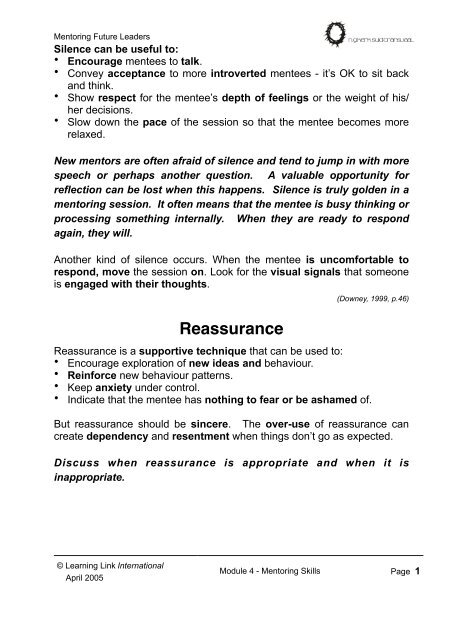Mentoring Future Leaders
You also want an ePaper? Increase the reach of your titles
YUMPU automatically turns print PDFs into web optimized ePapers that Google loves.
<strong>Mentoring</strong> <strong>Future</strong> <strong>Leaders</strong><br />
Silence can be useful to:<br />
• Encourage mentees to talk.<br />
• Convey acceptance to more introverted mentees - it’s OK to sit back<br />
and think.<br />
• Show respect for the mentee’s depth of feelings or the weight of his/<br />
her decisions.<br />
• Slow down the pace of the session so that the mentee becomes more<br />
relaxed.<br />
New mentors are often afraid of silence and tend to jump in with more<br />
speech or perhaps another question. A valuable opportunity for<br />
reflection can be lost when this happens. Silence is truly golden in a<br />
mentoring session. It often means that the mentee is busy thinking or<br />
processing something internally. When they are ready to respond<br />
again, they will.<br />
Another kind of silence occurs. When the mentee is uncomfortable to<br />
respond, move the session on. Look for the visual signals that someone<br />
is engaged with their thoughts.<br />
© Learning Link International<strong> </strong><br />
April 2005<br />
Reassurance<br />
(Downey, 1999, p.46)<br />
Reassurance is a supportive technique that can be used to:<br />
• Encourage exploration of new ideas and behaviour.<br />
• Reinforce new behaviour patterns.<br />
• Keep anxiety under control.<br />
• Indicate that the mentee has nothing to fear or be ashamed of.<br />
But reassurance should be sincere. The over-use of reassurance can<br />
create dependency and resentment when things don’t go as expected.<br />
Discuss when reassurance is appropriate and when it is<br />
inappropriate.<br />
Module 4 - <strong>Mentoring</strong> Skills Page ! 1




